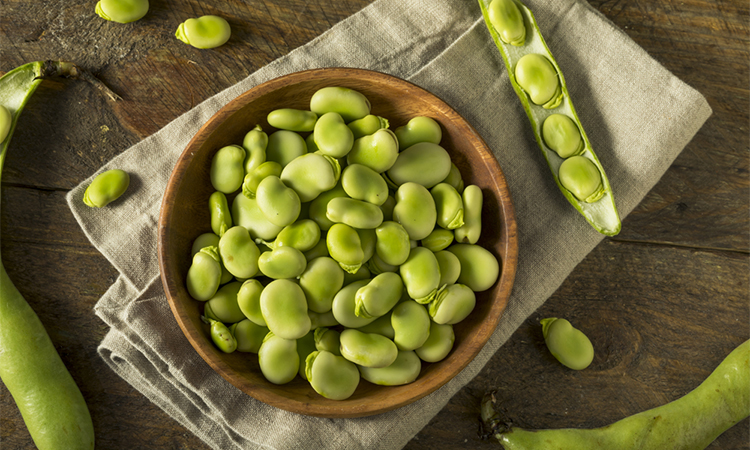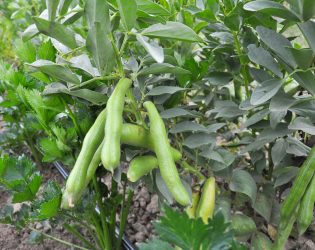Fabulous faba beans: is the British grown crop the key to fixing a food crisis?
- Like
- Digg
- Del
- Tumblr
- VKontakte
- Buffer
- Love This
- Odnoklassniki
- Meneame
- Blogger
- Amazon
- Yahoo Mail
- Gmail
- AOL
- Newsvine
- HackerNews
- Evernote
- MySpace
- Mail.ru
- Viadeo
- Line
- Comments
- Yummly
- SMS
- Viber
- Telegram
- Subscribe
- Skype
- Facebook Messenger
- Kakao
- LiveJournal
- Yammer
- Edgar
- Fintel
- Mix
- Instapaper
- Copy Link
Posted: 28 February 2023 | Ria Kakkad (New Food) | No comments yet
2023 has kickstarted the year of the faba bean — the past few months have already seen campaigns to increase the production and consumption of the British grown crop and make them a staple in the nation’s diets. New Food explores the increasing popularity of faba beans and how they could improve British diets and help the environment.


Faba beans have been grown across the UK for thousands of years. Approximately 740,000 tonnes of faba beans are harvested each year in the UK on around 170,000 hectares of land. However, until recently, a large amount of the beans have been exported to the Middle East and or used as animal feed.
Earlier in January 2023, Tesco announced a partnership with faba bean processor, AB Mauri, and food manufacturer, Samworth Brothers, to triple their production. As for its customers, Tesco is trialling adding the beans across a wide range of products and ingredients.
“As we look to overcome challenges like food security, climate change, and biodiversity loss, foods like fava beans could also help us establish a circular food system, as they can also be used in different crop rotations and be fed to animals,” said Emily Rout, Sustainable Food and Innovation Manager at Tesco.
“It really could be a miracle crop in terms of improving sustainability across our food system.”
Benefits of faba beans
Indeed, many researchers favour faba beans over other legumes due to their environmentally friendly benefits.
“Faba beans, like all pulses, are nitrogen-fixing, meaning they can capture atmospheric nitrogen and transfer it into the soil,” explained the Global Pulse Confederation. “This leaves the soil healthier for other crops in the rotation and reduces the need for chemical fertilisers – a pertinent issue considering the war in Ukraine and the impact on global fertiliser supplies.”


“Faba beans, like all pulses, are nitrogen-fixing, meaning they can capture atmospheric nitrogen and transfer it into the soil,” explained the Global Pulse Confederation.
“Furthermore, the beans also require significantly less water than livestock and soy, further lowering their carbon footprint,” they added.
It is predicted that in 2030, the global demand for water will increase by 40 percent. Therefore, food solutions such as faba beans that require less water could be crucial.
As well as the benefits for the environment, faba beans also have many nutrients. According to a study published in Nutrients, faba beans are particularly high in easily digested protein, fibre, and iron, nutrients that have previously been found to be low in UK diets.
Faba beans facing challenges
“Limitations are mostly around consumer awareness. Faba beans, despite growing well in the UK, tend to feature rarely in British diets and UK production tends to be exported to Egypt or used for feed or aquaculture,” argued Global Pulse Confederation. “Consumers need to be educated on the benefits of eating them as a delicious, nutritious, sustainable food source. They have one of the highest protein contents of any pulse crop.”
Due to this lack of awareness, scientists from the University of Reading and Raising the Pulse are in fact aiming to transform British diets by adding more faba beans into the nation’s daily bread intake.
“We had to think laterally: What do most people eat and how can we improve their nutrition without them having to change their diets? The obvious answer is bread!” explained Professor Julie Lovegrove, leader of the Raising the Pulse programme.
“96 percent of people in the UK eat bread, and 90 percent of that is white bread, which in most cases contains soya. We’ve already performed some experiments and found that faba bean flour can directly replace imported soya flour and some of the wheat flour, which is low in nutrients. We can not only grow the faba beans here, but also produce and test the faba bean-rich bread, with improved nutritional quality,” she added.
Without a doubt, faba beans could have the potential to play an important role in addressing food security and nutrition challenges. By recognising and supporting the value of this legume, the food industry can make strides towards a healthier and more sustainable food system.
Related topics
Environment, Food Security, Health & Nutrition, Ingredients, Plant based, Research & development, retail, Supermarket, Sustainability, Water
Related organisations
AB Mauri, Global Pulse Confederation, Samworth Brothers, Tesco









